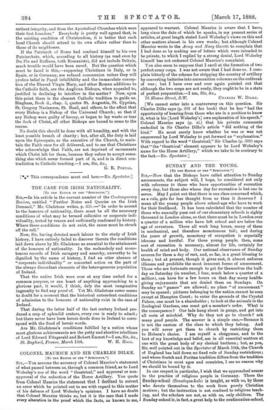COLONEL MAURICE AND SIR CHARLES DILKE.
[To THE EDITOR OF THE "SPECTATOR.") SIR,—Yon assume the accuracy of Colonel Maurice's statement of what passed between us, through a common friend, as to Lord Wolseley's use of the word "theatrical," and approval or non- approval of the reduction of the Horse Artillery. You quote from Colonel Maurice the statement that I declined to correct an error which he pointed out to me with regard to this matter of his defence of Lord Wolseley's opinions. I have no doubt that Colonel Maurice thinks so, but it is the case that I made every alteration in the proof which the facts, as known to me, appeared to warrant. Colonel Maurice is aware that I have, long since the date of which he speaks, in my present series of articles, at great length stated Lord Wolseley's views on this and other matters almost in his own words ; but although Colonel Maurice wrote to the Army and Navy Gazette to complain that I had done so by making use of letters which were intended to be private, to which I replied by a strong denial, Lord Wolseley himself has not endorsed Colonel Manrice's complaint.
You also seem to suppose that I cavil at the formation of two perfect army corps. I was not aware that I had done so. I com- plain bitterly of the scheme for stripping the country of artillery by converting batteries into ammunition columns on the outbreak of war ; but I have over and over again pointed out that although the two corps are not ready, they ought to be in a state of perfect preparation.—I am, Sir, &c.,
[We cannot enter into a controversy on this question. Sir Charles Dilke says (p. 301 of his book) that he has "had the opportunity of hearing from those who are in a position to know it, what is his [Lord Wolseley's] own explanation of his speech." Colonel Maurice says (p. xi.) that his private comments embodied in Sir Charles Dilke's article "did nothing of the kind." He must surely know whether he was or was not empowered by Lord Wolseley to put forward an "explanation." With regard to the word "theatrical," Sir Charles (p. 309) says that" the 'theatrical' element appears to be Lord Wolseley's name for the Horse Artillery," which we take to be contrary to the fact.—En. Spectator.]


































 Previous page
Previous page